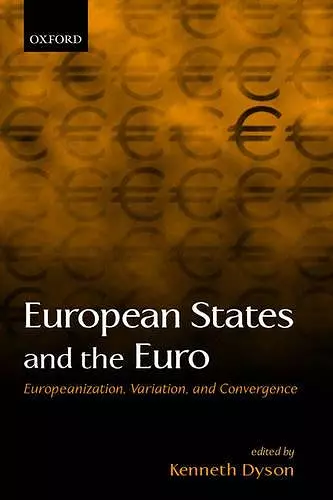European States and the Euro
Europeanization, Variation, and Convergence
Format:Hardback
Publisher:Oxford University Press
Published:7th Mar '02
Currently unavailable, and unfortunately no date known when it will be back
This hardback is available in another edition too:
- Paperback£48.49(9780199250257)

With Economic and Monetary Union, the European Union has embarked on one of the biggest projects in its history. Previous literature has focused on how EMU came into being and on the policy issues that it raises. European States and the Euro seeks to move the discussion forwards by offering the first systematic evaluation of how it is affecting EU states, both members and non-members of the Euro-Zone. It is the first book to explicitly situate EMU in the growing literature on Europeanization. It examines the effects on public policies, political structures, discourses, and identities. The book seeks to identify the scope of EMU's effects, the direction that it imparts to political and policy changes, the mechanisms by which it produces its effects, and the role of domestic institutions, political leadership and specific forms of discourse in shaping responses. In addition, the book assesses how, and with what effects, EMU is affecting key policy sectors¾labour markets and wages, welfare states, and financial market governance. What conditions the degree of convergence discernible in these sectors? Finally, the book seeks to 'contextualize' EMU by assessing its effects both in comparison with other variables like globalization and in a historical perspective of the European Monetary System as a 'training ground'. The book combines sectoral and country case studies with a thematic treatment by recognized experts in their fields. It moves from globalization, through EU-level changes, to member states and finally to specific sectors. The main conclusions are that EMU is most important in affecting the timing, tempo and rhythm of domestic change¾that these changes are experienced pre-eminently at the level of policy; that it strengthens pressures for convergence; but that different domestic institutional arrangements and discourses lead to variations in policy processes and effects and in the way change is 'framed'. In particular, whilst EMU contains a neo-liberalizing tendency exhibited most clearly in financial market effects, it is not to be characterized as a neo-liberal project by means of which the EU is becoming an economic and social space simply converging around Anglo-American market capitalism.
ISBN: 9780199250264
Dimensions: 242mm x 162mm x 28mm
Weight: 748g
430 pages